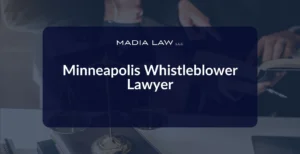
If your employer punished you for reporting fraud, safety violations, harassment, or wage theft, you need a legal team that acts fast and fights hard. Madia Law LLC serves as a dedicated Minneapolis whistleblower claims lawyer, protecting employees who face retaliation for doing the right thing.
Our attorneys have secured over $10 million for Minnesota workers by taking cases to trial and forcing accountability. We represent employees, not companies, and use strategic litigation to recover lost wages, restore reputations, and stop further retaliation.
Visit the Office at IDS Center, Suite 4155, 80 South 8th Street, Minneapolis, MN 55402, or contact us at (612) 349-2729
All consultations are confidential and scheduled directly with an experienced attorney.
Minneapolis Whistleblower Lawyers Fighting Unlawful Employer Actions
Whistleblower claims demand an employment law firm that won’t hesitate to confront an employer’s power. At Madia Law LLC, we bring decades of trial experience to every whistleblower case and leverage that reputation to force meaningful outcomes for our clients. Employers know we don’t bluff; we prepare every case as if it’s going to a verdict, and that pressure often changes how they respond.
Our approach is direct: we move quickly to lock down your position, counter the employer’s narrative, and drive the case toward the strongest financial and professional remedy available. When your livelihood is threatened, you need a legal team capable of shifting the balance of power immediately.
For a legal consultation with a whistleblower claims lawyer serving Minneapolis, call 612-349-2729
Unlawful Employer Actions We Pursue in Whistleblower Cases
When you speak up about fraud, discrimination, safety risks, wage theft, or other illegal conduct, employers sometimes respond with actions meant to silence you or drive you out. Our employment lawyers in Minneapolis move quickly when these unlawful job actions appear and pursue them through focused legal claims, including:
- Wrongful termination: Firings disguised as “restructuring” or “performance issues,” which we pursue aggressively through dedicated wrongful termination claims.
- Hostile work environments: Sudden exclusion, sexual harassment, or targeting after your report, which we confront through focused hostile work environment litigation.
- Discriminatory treatment: Retaliation tied to protected characteristics such as sex or disability, linked to our work in sex discrimination and disability discrimination cases.
- Wage retaliation: Cut hours, withheld pay, or pay reductions following your report, which we address through targeted unpaid wage claims.
- Career harm: Blocked promotions, denied raises, or stalled advancement, designed to punish your integrity.
When employers take unlawful action after you speak up, we act fast to secure evidence, establish your timeline, and build a litigation-ready case that holds them fully accountable.
Minneapolis Whistleblower Claims Lawyer Near Me 612-349-2729
Our Litigation-Driven Approach to Proving Illegal Employer Conduct
We win retaliation cases by building a clear, trial-ready record that exposes the employer’s true motive. Our approach is straightforward and backed by evidence that holds up in litigation:
- You made a protected report by raising concerns about legal violations or workplace misconduct.
- Your employer reacted with harmful action, a material change that negatively affected your job or career.
- The evidence ties the two together through emails, HR documents, performance records, timing, and policy deviations that reveal the employer’s true motive.
When an employer’s explanation doesn’t line up with the timeline or their own documentation, we use those inconsistencies to prove wrongdoing and drive your case toward the strongest possible financial outcome.
Click to contact our Employment Lawyers in Minneapolis, MN for Workplace Legal Issues today
Whistleblower Legal Protections We Leverage to Strengthen Your Case
Minnesota and federal laws provide powerful protections for employees who report illegal conduct. We use these statutes strategically to protect your rights and hold employers accountable.
- Minnesota Whistleblower Act: Used to protect employees who make a good-faith report of any legal violation, including regulatory breaches, workplace misconduct, or unethical activity, even when the violation is never proven.
- False Claims Act (Federal): Applied when your report involves fraud against government programs, such as healthcare or billing fraud, giving us strong tools to pursue damages.
- Qui Tam Actions: Used in cases involving misuse of public funds, allowing whistleblowers to file suit on the government’s behalf and potentially receive a significant share of the recovery.
- OSHA Whistleblower Protections: Leveraged when you report unsafe working conditions or hazards, ensuring employers cannot retaliate for raising safety concerns.
- Sarbanes-Oxley (SOX): Used to protect employees of publicly traded companies who report financial fraud, shareholder deception, or corporate misconduct.
- Additional Federal Safeguards: Applied in industries with specialized protections, including healthcare, banking, transportation, government contracting, and consumer finance.
We identify which laws provide the strongest protection for your situation, apply the right statute to your claim, and take swift action when an employer retaliates.
Complete a Case Evaluation form now
Damages Our Lawyers Pursue in Whistleblower Cases
When an employer retaliates after you report unlawful conduct, you may be entitled to significant financial recovery under Minnesota and federal whistleblower statutes. These remedies are designed to make you whole and hold employers fully accountable for the harm they caused.
We pursue compensation across four key categories:
- Back Pay: Recovery of lost wages, overtime, benefits, and bonuses from the date of retaliation through the resolution of your case.
- Front Pay: Compensation for future lost earnings when reinstatement isn’t possible due to termination or forced resignation.
- Emotional Distress Damages: Monetary compensation for stress, anxiety, reputational harm, and the personal toll of the employer’s actions.
- Punitive Damages: Additional financial penalties when an employer’s conduct was malicious, reckless, or intentionally harmful.
Our firm evaluates every case with a litigation-focused approach, calculating the full scope of your economic and personal losses to pursue the maximum financial outcome available under Minnesota and federal whistleblower laws.
Proven Case Results in Whistleblower Lawsuits
Our whistleblower team has secured millions for Minnesota employees who were punished for speaking up. We bring the same trial-ready pressure to every case, forcing employers to pay for the harm they caused and delivering results that change our clients’ lives.
| 3 Million
Settlement procured 2 weeks before scheduled trial, for an employee who was terminated after disclosing a disability and requesting a reasonable accommodation. |
2.4 Million
Settlement procured on behalf of a brave employee who was terminated after reporting gender discrimination in the workplace. |
2.1 Million
Jury verdict reached on behalf of an employee who was terminated after reporting concerns of race discrimination on behalf of a fellow employee. |
| 1.95 Million
Settlement reached on behalf of 4 employees who were terminated after reporting sexual harassment and assault on the job. |
1.3 Million
Jury verdict reached in favor of an employee who was discriminated against due to his disability and who was ultimately terminated after formally reporting the discrimination. |
650k
Settlement reached on behalf of two employees who were terminated after seeking out Worker’s Compensation Benefits following workplace injuries. |
Real Client Feedback on Our Trial-Focused Representation
See how Minnesota workers describe their experience with our whistleblower attorneys and the results we delivered for them.
Madia Law delivers!
Competence, I demand competence. Ashwin and Zane digested all the elements of my case, a complex case with a plethora of moving parts yet distilled it down to its essence. Don’t be a victim, stand strong, keep your nose clean and give Sara a call at Madia Law.
Robert Roswick
⭐⭐⭐⭐⭐
If you’re reading this, it’s awful that you are in a position right now where you are online searching for an attorney. I searched online as you are perhaps doing now, read some reviews and settled on an attorney after doing some research. I’ll never forget how blown away I was after my first meeting with Ashwin Madia. I was fortunate to have this man represent me. I am eternally grateful.
No need to search any longer. You’ve found the right lawyer.
Kevin K
⭐⭐⭐⭐⭐
I was referred to Ashwin Madia when it became evident that my case was going to jury trial. He is definitely an expert as a trial lawyer. I found him to be very straightforward, no nonsense, a clear communicator, and I was pleased with the outcome he brought at trial. I would recommend him, and I would go to him again to represent me if the need ever arises.
Jennifer Peters
⭐⭐⭐⭐⭐
I would encourage you to spend some time reading Mr. Madia’s impressive bio. If that doesn’t have you convinced, I will tell you that as someone who spent over 19 years in law enforcement, I have never seen a better trial lawyer than Ashwin. His passion, expertise, ethical commitment, and his incredible memory of the facts, were some of the major reasons I prevailed in my discrimination lawsuit against my employer. Thanks again!
Pete Gregerson
⭐⭐⭐⭐⭐
FAQs About Whistleblower Claims in Minneapolis
How Long Do I Have to File a Whistleblower Claim in Minnesota?
To file a whistleblower claim in Minnesota, you generally have six years under the Minnesota Whistleblower Act. The deadline for a whistleblower claim in Minnesota can vary based on the facts, so early legal review is crucial.
How Much Does a Whistleblower Lawyer Cost in Minnesota?
To understand how much a whistleblower lawyer costs in Minnesota, know this: most retaliation cases are handled on a contingency fee, meaning you pay nothing up front and only pay if compensation is recovered.
How Long Do Minnesota Whistleblower Cases Usually Take to Resolve?
Minnesota whistleblower cases resolve within 6-18 months, though complex claims involving extensive records or depositions may take longer. The timeline for Minnesota whistleblower cases depends on employer cooperation and litigation strategy.
Can I Bring a Whistleblower Claim if I’m Still Working for the Same Employer?
Yes. You can bring a whistleblower claim if you’re still working for the same employer. Minnesota law protects employees from retaliation even while employed, and filing a claim can stop its escalation.
Can I Still File a Whistleblower Claim if I Signed a Severance or NDA?
It depends. You can still file a whistleblower claim if you signed a severance or NDA in many cases, because employers cannot waive whistleblower protection rights. Whether your severance or NDA blocks a retaliation claim varies by language and timing.
Take the Next Step in Your Whistleblower Case
If you’ve experienced negative job consequences for reporting misconduct, now is the time to protect your rights before your employer gains any additional advantage. With decades of courtroom experience behind every case we handle, Madia Law LLC provides a direct, attorney-led consultation to assess your claim, secure key evidence, and plan the best course of action. When you contact us, you will speak with a Minneapolis whistleblower lawyer who knows how quickly these situations can escalate and what it takes to stop it.
We also fight cases regarding workplace sexual harassment, wrongful termination, wage disputes, and racial discrimination.
Call 612-349-2729 or complete a Case Evaluation form



